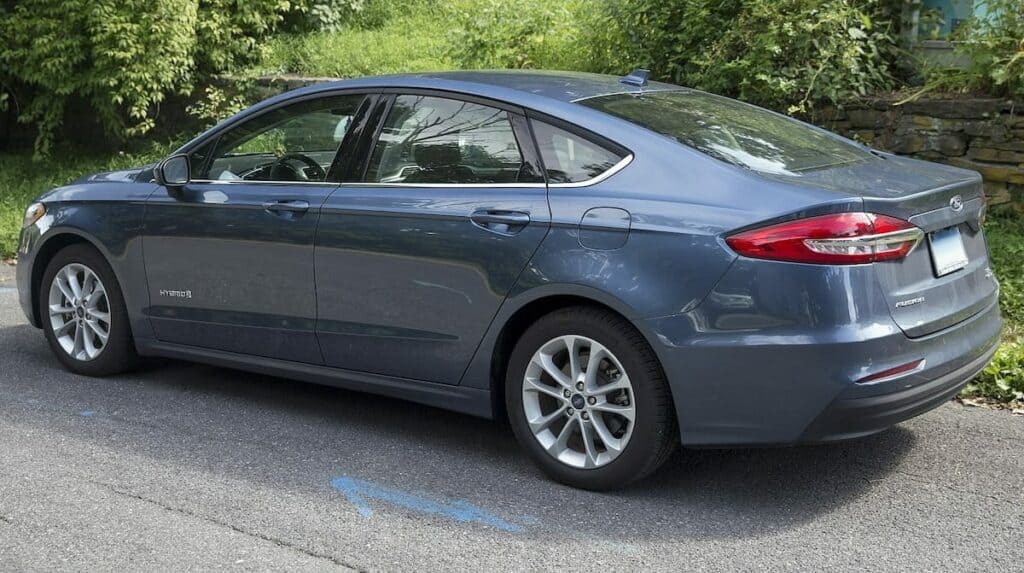Beware of Ford’s Deceptive “Statutory Refund” and “Trade In” Program for Dangerously Defective 2019 and 2020 Ford Fusion Energi Plug-In Hybrids
Notice Regarding Safety Recall Notice 23S33 / NHTSA Recall 23V440
Ford recently recalled approximately 15,000 Model Year 2019-20 Fusion Energis plug-in hybrid (PHEV) sedans because they may not start, lose power when driving, and risk catching fire while driving. Regular hybrid and non-hybrid Fusion sedans are not included in this recall.
These Ford Fusion Energis have a defective Battery Energy Control Module (BECM) that causes dangerous shutdowns and even vehicle fires when driving.
Ford suspects the problem occurs when a battery’s current interrupt device (CID) activates and sends too much current through the battery energy control module (BECM). CIDs are designed to cut off an electrical circuit if they detect a battery fault, but Ford said it did not yet know why the device is activating.
Ford has stated publicly that a “power loss” condition is what most customers who have a related problem are reporting. If the problem occurs when driving, there may be a warning to “stop safely now” before an involuntary loss of power.
The power loss issue is a widespread problem. As of last summer, according to documents from the National Highway Traffic Safety Administration (NHTSA), Ford was already aware of seven fires and had 270 warranty claims. Ford told NHTSA that five of these fires took place at dealerships while technicians were replacing the BECM, and two took place while a vehicle was being driven.
What’s worse, Ford has admitted it has no current fix and will not likely have any fix until July 2025. (See Safety Recall Notice 23S33 / NHTSA Recall 23V440.)
Many customers have taken their vehicle to a Ford-authorized repair facility and are often surprised to learn that Ford merely cut off the ability to use plug-in charging—the whole point of a plug-in hybrid. Not only were customers unwittingly driving a dangerously unsafe vehicle, but now they are left without a key function promised at lease.
One would think Ford would do the right thing, considering their admissions, and provide consumers with what they are entitled to under the law. Not so. Instead, Ford is now soliciting trade-ins by deceptively offering a “statutory refund” scheme. Representing its program is authorized by the government and operating per “statute” is untrue and deceptive.
Ford states on its website the following:
Ford is offering customers a statutory refund of the vehicle’s purchase price, less a reasonable allowance for depreciation. The “refund amount” is based on fair market value of the vehicle, plus a 15% premium. “Fair market value” is based on the original Manufacturer’s Suggested Retail Price (MSRP), less depreciation as determined using regional market data, and does not include the cost of any modifications made to the vehicle after the first retail sale. This alternative remedy will be offered until July 1, 2025, when sufficient quantities of high voltage batteries are expected to be available for final remedy repairs.”
(Ford website, emphasis added.)
Ford also calls this program a “Trade-in” program, trying to force customers into their Ford dealerships’ high-pressure sales offices to “trade-in” their vehicle and buy yet another Ford.
Ford does not state what “statute” it says it is complying with, but it is not the statutory refund required under California law. As Ford knows but customers likely do not, California’s lemon law provides for a much better repurchase and one that has nothing to do with the vehicle’s MSRP or “market value depreciation.” See Cal. Civ. Code §§ 1793.2(d)(2)(B)(C).
Instead, the Song-Beverly Consumer Warranty Act (the “Song Beverly Act”), California Civil Code §§ 1790 et seq., provides:
If the manufacturer … is unable to service or repair a new motor vehicle . . . to conform to the applicable express warranties after a reasonable number of attempts, the manufacturer shall either promptly replace the new motor vehicle . . . or promptly make restitution to the buyer . . . However, the buyer shall be free to elect restitution in lieu of replacement.
(B) In the case of restitution, the manufacturer shall make restitution in the amount equal to the actual price paid or payable by the buyer, including any charges for transportation and manufacturer installed options . . . and including any collateral charges such as sales tax, license fees, registration fees and other official fees, plus any incidental damages . . . including but not limited to reasonable repairs, towing and rental car costs actually incurred by the buyer.”
See California Civil Code § 1793.2(d)(2) (emphasis added).
The Act goes on to state:
(b) If the buyer establishes that the failure to comply was willful, the judgment may include, in addition to the amounts recovered, a civil penalty which shall not exceed two times the amount of actual damages. . . . .”
California Civil Code §§ 1794 (emphasis added).
Where liability appears so clear, the denial of actual statutory obligations under the Lemon Law (including this deceptive trade-in “statutory repurchase” program), a Court may find Ford’s conduct to be “willful,” triggering this civil penalty provision.
For several reasons, these provisions are essential for you to know. First, the Song-Beverly Act pays back more – up to two times the total price if the conduct is found to be willful — and in no way reduces the amount of the refund by “depreciation.” Instead, the Song-Beverly Act bases its refunds on the cash price of the vehicle paid and refunds collateral charges such as sales or use tax, license and registration fees, etc.
Second, the Song-Beverly Act does not provide an offset due to “depreciation”; instead, it is based on a statutory formula.
Third, the Song-Beverly Act is in no way a “trade-in” program, as consumers are not required to “trade-in” the vehicles or step foot in Ford’s high-pressure sales offices where dealers can inflate prices and pack consumer contracts with expensive items. Instead, the Song-Beverly Act is meant to get lemon vehicles off the roads, the vehicles’ titles branded, and the vehicles physically labeled “lemon law buybacks.” See Cal. Civ. Code §§ 1793.23-.26.
The remedies also apply even if the consumer no longer has the vehicle, which many fearful or frustrated customers may not.
You are not required to live with this problem vehicle, take Ford’s “statutory refund,” or trade in your vehicle. Do not let Ford take advantage of you by offering a program that violates the law to remove dangerous vehicles from the road.
Under California law, Ford is required to provide true statutory restitution for the “lemons” it sold to unknowing consumers.
If you would like a free, confidential consultation with an experienced California lemon law attorney, simply fill out the form below.



